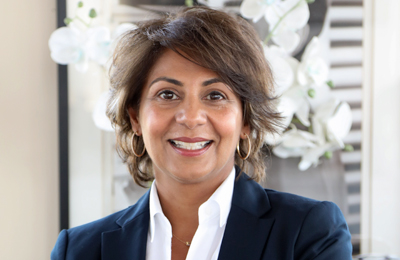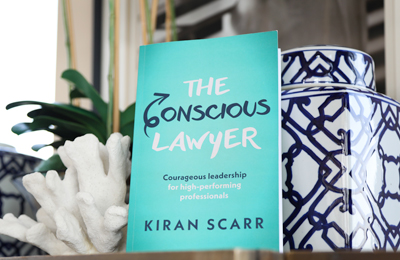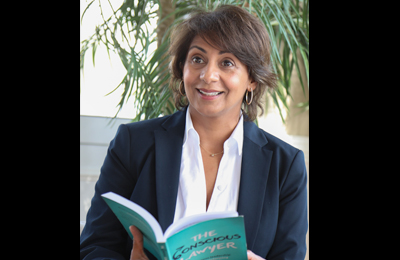The higher purpose of leadership

The Conscious Lawyer, authored by Kiran Scarr, inspires leaders to embrace growth mindset and have the courage to lead through radical change to deliver greater value for their organisations.
As an international lawyer, general counsel and law firm COO, Kiran Scarr has spent a global career leading transformational change in the legal sector. Her experience has been widely recognised: she has been multi-awarded individually as General Counsel of the Year and with her teams for legal technology innovation, compliance innovation, championing diversity and contribution to the in-house legal community.
Kiran holds an LLB (Hons) from University of Glasgow and worked 25+ years as a lawyer in UK, Australia, Singapore and the Middle East. She is REACH mentor to senior female leaders and a qualified executive coach, helping law firms and legal departments transform the way they lead themselves and their businesses through global challenge and disruption.
A prominent keynote speaker and thought leader on leading through change, Kiran’s publication, The Conscious Lawyer, is a simple, powerful roadmap for senior lawyers in up-levelling their leadership, to advance the future of law.
She talks to the Oath on the learnings that led her to write the book and what it takes to be a conscious lawyer.
1. Congratulations on publishing The Conscious Lawyer! Tell us more about what inspired you to write this book.
As lawyers, I think we’ve acknowledged for some time that clients and businesses want us to deliver legal services differently. As I interacted more with commercial business leaders, I realised that lawyers had to radically change the way they lead in two keys areas. They had to:
- Be more client-centric – to respond to the demand for new business models, fit-for-purpose innovative solutions to client problems, and flexible resourcing capabilities; and
- Be more human – to motivate the new generation of lawyers and harness the unlimited potential of the technological future of law.
This requires a radical shift in mindset and behaviour; not an easy task for a typical high performing, results-orientated lawyer! It’s a process of change that requires reflection, support and greater insight. I felt a book that leads us through this journey of change would encourage lawyers to take the courageous first leap into making change happen for themselves and the people around them.
2. It’d be great for our readers to have an insight into your career journey.
I spent the first 15+ years of my legal career as an international projects lawyer, based in UK, Australia, Singapore and Dubai. I often describe this phase of my career as ‘doing high performance’. I was a results-orientated high achiever, delivering a conveyor belt of multi-million dollar cross-border transactions. In search of greater autonomy and fulfilment, I spent the next 5+ years as general counsel at Dubai Multi Commodities Centre, the global leading free zone. As head of the regulatory authority of DMCC, I drove large-scale transformation of the legal, compliance, regulatory affairs and dispute centre functions. It’s where my passion for leading through change took hold. Since 2019, my search for greater meaning in life and work has led me into a portfolio practice in which I combine executive coaching with my passion for helping others lead transformational change in the legal sector. This has taken me from COO of Support Legal – a boutique New Law firm disrupting the legal sector in the Middle East – to coaching and mentoring senior lawyers in changing the way they lead themselves, their teams and the businesses they serve. It was a natural next step to publish The Conscious Lawyer; a roadmap in how to up-level your leadership from focus on results to unleashing human potential and greater purpose.
3. Are there any specific experiences from your prolific legal background that you draw from in the book?
 The years spent as a general counsel opened me up to the abundance of conscious leadership. It’s tough being an in-house lawyer in these times of rising global challenge, technological disruption, and generational shifts in the workplace. Whilst in-house teams retain their traditional role as moral compass for the businesses they serve, they must balance ethics with business enablement, looking to unlock capital and contribute to revenue generation as much as protect reputation and brand. As business cost centres, they also must demonstrate continued budget savings and efficiency and productivity gains through process enhancement and leaner resourcing. Put simply, they must do more with less. I learnt quickly that the leadership traits that had served me well as a private practice lawyer – high-performance, results focused, output driven – were no longer fit for purpose in delivering value at executive level. I had to up-level my leadership to become a values-based, purpose driven, people leader who had the courage to lead through radical change to deliver greater value for the people around me.
The years spent as a general counsel opened me up to the abundance of conscious leadership. It’s tough being an in-house lawyer in these times of rising global challenge, technological disruption, and generational shifts in the workplace. Whilst in-house teams retain their traditional role as moral compass for the businesses they serve, they must balance ethics with business enablement, looking to unlock capital and contribute to revenue generation as much as protect reputation and brand. As business cost centres, they also must demonstrate continued budget savings and efficiency and productivity gains through process enhancement and leaner resourcing. Put simply, they must do more with less. I learnt quickly that the leadership traits that had served me well as a private practice lawyer – high-performance, results focused, output driven – were no longer fit for purpose in delivering value at executive level. I had to up-level my leadership to become a values-based, purpose driven, people leader who had the courage to lead through radical change to deliver greater value for the people around me.
4. In your book, you talk about how the path to being a ‘conscious lawyer’ takes ‘a deliberate choice to lead differently’. In your view, what does it take to be a change leader?
At its core, change leadership requires a shift in mindset.
A results-focused lawyer is invariably in fixed mindset. The core belief of someone who is sitting in fixed mindset is that their personal traits – intelligence, personality, moral character – are fixed. This can create an urgency to continually prove oneself, using financial results, earnings and job title as a sure-footed way of demonstrating success. Growth mindset, on the other hand, is based on the fundamental belief that everyone has potential and can improve through application and experience. Lawyers who embrace growth mindset believe that their qualities can be continually cultivated by effort to teach them how to evolve as human beings.
This means that the focus of attention shifts. Traditional lawyers will look at short-term results to determine levels of success. Conscious lawyers drop any attachment to results and replace it with a belief in human ability to improve. This means performance is measured not by achieving results but by achieving progress in learning. When we relinquish control over results, we unleash unlimited potential in the people around us to create, ideate and innovate. And change happens.
5. You talk about how it is critical for leaders to shift their attention from delivering results to developing people. Can you share the top 3 ways leaders can focus on developing people while delivering results?
We can develop people AND deliver exceptional results by behaving differently.
First, we must become enablers, ensuring others fulfil their potential. It starts with having a clear vision for the future and communicating it in ways that resonate with people. We achieve this by becoming strategic in our thinking, developing people, processes, procedures, and goals based on long term, sustainable outcomes rather than short-term results.
Second, we must become facilitators, creating the optimum environment for learning and growth. Rather than encouraging a competitive environment focused on wins and being the best, we focus on the process of collaboration and the role of people in that. We get to know the people around us at human level, and uncover the strengths, weaknesses, and potential in all of them. The emphasis is on growth through learning, and we develop people with stretch projects, challenges, and enhanced responsibilities.
Third, we must become coaches, holding space for the people around us to grow, learn, and make their highest level of contribution. The core skill here is emotional intelligence; having attuned levels of self-awareness and self-management to notice, and control, emotions so that we can handle relationships with empathy and tact and achieve progress in a self-motivated way. We also use coaching skills. For example, we influence, rather than control, we ask rather than tell, we listen rather than demand and we encourage rather than criticise.
By being an enabler, facilitator and coach, we empower the people around us to learn and grow for themselves.
6. How did you come up with ‘The CARE Model’? Please tell us more about how following this model will enable leaders to lead high-performing teams.
The CARE model is a path that I journeyed in my evolution from private practice lawyer to general counsel to law firm COO. When I look back on the steps I took in changing my mindset and behaviour, I realised that it involved 4 fundamental leaps:
Leap 1 was to Connect. I needed to connect to who I really am as a leader in my own life. This was a journey into understanding my true self (who I am) rather than my ego self (who I tell myself I am).
Leap 2 was to Awaken. I needed to awaken in me a higher calling in life and work beyond financial success. This was a journey in unearthing how we all must make our highest contribution to what the world needs.
Leap 3 was to Relate. I needed to focus on the relationships around me, more specifically, the impact I had on people. This meant stepping up to a higher level of integrity as a leader to empower others to learn and grow.
Leap 4 was to Entrust. I needed to build trust in myself before I could build trust in others. This meant starting to believe in our own abilities to change in order to build the capacity of others to change too.
If you want to courageously lead high-performance teams into the future of law, you must Connect to the leader inside you to Awaken your true purpose. Only then will you start to Relate to the people around you on a deeper conscious level and Entrust them to fulfil their highest potential.
7. Having worked in the Middle East for many years, are there any leadership styles or lessons specific to the region that you have learned/picked up on along the way?
 What makes working in the Middle East so rewarding – visionary change, entrepreneurship, diversity, regulatory evolution – also makes it challenging. This means leaders in this region, above all, must be versatile. Agility in thought and action must come with a willingness to experiment, try new approaches and venture into the unknown. It also means being open to mistakes, course correction and failing fast. Looking back, I have been most effective as a leader when I have shifted my approach from ‘command and control’ to collaborative and inclusive leadership. It starts with submerging ego. Only when we shift from an entrenched position of entitlement (in service of me) to one of humility (in service of others) do we invoke the power of empathy and compassion. When we do that, we shift from a culture of blame to a culture of growth. The people around us thrive because they are making choices from a place of empowerment rather than fear. Limitations on their authority are replaced with parameters for learning. And the result is this: they surpass our highest expectations.
What makes working in the Middle East so rewarding – visionary change, entrepreneurship, diversity, regulatory evolution – also makes it challenging. This means leaders in this region, above all, must be versatile. Agility in thought and action must come with a willingness to experiment, try new approaches and venture into the unknown. It also means being open to mistakes, course correction and failing fast. Looking back, I have been most effective as a leader when I have shifted my approach from ‘command and control’ to collaborative and inclusive leadership. It starts with submerging ego. Only when we shift from an entrenched position of entitlement (in service of me) to one of humility (in service of others) do we invoke the power of empathy and compassion. When we do that, we shift from a culture of blame to a culture of growth. The people around us thrive because they are making choices from a place of empowerment rather than fear. Limitations on their authority are replaced with parameters for learning. And the result is this: they surpass our highest expectations.
8. What would be your advice to leaders/future leaders who maybe struggling with driving change at their organisations or within their teams?
We cannot effect meaningful change in the systems and people around us unless we are open to change in ourselves. We must create the urgency to change inside of us and role model to others what change looks like in action. People trust us because of our capabilities, consistency and humanness. But these are not fixed qualities. We are credible as leaders not because of what we achieved in the past but by how we influence in the present. So, we must be open, honest and transparent with people on change as it happens. And we must treat change not as an outcome, but as a continual process that unfolds.
By showing our own willingness to learn and grow as change leaders, we are role modelling how it is to lead through change. In doing so, we connect people to their capacity to lead themselves through change. And change becomes effortless.














































































































